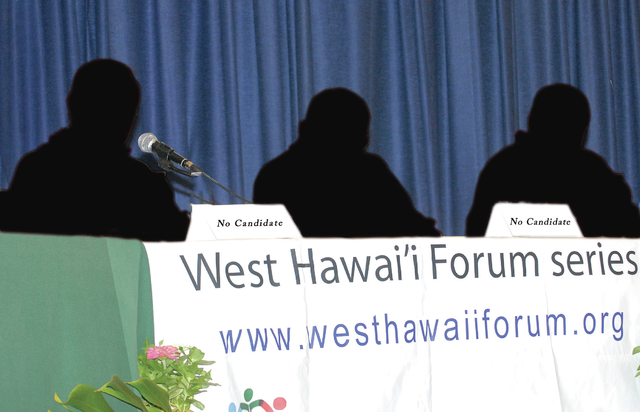With primaries over, one Republican candidate yearns for forum opportunity
A previous version of this article incorrectly identified Donna Oba as Donna Obo in several instances. It also listed her as a current co-president of the League of Women Voters of Hawaii County. She is actually a former co-president. It is the policy of the West Hawaii Today to correct promptly any incorrect or misleading information once it has been brought to the attention of the newspaper.
KAILUA-KONA — If there are, in fact, any perks of being a wallflower, Bruce Pratt has found them elusive.
The Republican candidate in the race for the State House of Representatives in Kona’s 6th District is seeking a platform to disseminate his message, but it appears there’s none to be had.
Be it a debate or a town hall meeting, Pratt’s efforts to drum up a candidate forum before the general election, slated for Nov. 8, stem from a desire to give the voting public a chance to compare and contrast his positions and qualifications against Nicole Lowen, the seat’s two-time incumbent and runaway Democratic primary winner.
“I’m not particular about (the format),” Pratt said. “I just thought it was strange that we didn’t have anything scheduled in the district between the primary and the general.”
The West Hawaii Today was also unable to confirm any scheduled forums for State House races in District 7, where long-time incumbent Cindy Evans (D) will be challenged by Republican Jeff Coakley, or District 5, where incumbent Richard Creagan (D) is being challenged by Libertarian candidate Michael Last.
Pratt has reached out to the West Hawaii Today, the Kona-Kohala Chamber of Commerce, the League of Women Voters of Hawaii County and the West Hawaii Association of Realtors, but at this late stage in the process, it’s unlikely a forum will come together.
“The Kona-Kohala Chamber of Commerce does not have plans at this time for a candidate forum,” wrote Kirstin Kahaloa, executive director of the Chamber, in an email to the West Hawaii Today.
The Chamber did host a mayoral forum preceding the Aug. 13 primary election.
Donna Oba, former co-president of the Women’s League, said her organization also has no plans to put on another forum. The Women’s League hosted a mayoral forum in Hilo leading up to the primary, but won’t stage anything in West Hawaii before the general.
Tom Hasslinger, editor of the West Hawaii Today, said the publication, too, is unlikely to involve itself in the process at this point. The newspaper did not participate in any of the pre-primary forums and is not scheduled to host or co-host any forums before the general.
“We weren’t approached by anyone to partner,” Hasslinger said. “Had we been, I think we would have engaged with that. We haven’t taken a proactive approach in the sense that we haven’t partnered with anyone.”
Getting the word out
Pratt’s difficulties to produce a forum — which typically would be hosted by a neutral third party whose only stake in the game would be to inform voters — are emblematic of a general lack of voter access to candidate debates in district elections before primaries and generals alike.
His struggles could also point to a failure by local institutions to meet their responsibility of adequately informing the community — although that burden falls more heavily on entities like the West Hawaii Today and the Chamber of Commerce than community action groups like the Women’s League.
Hasslinger said it’s fair to criticize the West Hawaii Today for not assuming a leading role in that regard, but added there are other things the newspaper does to inform the electorate.
“We bring in the candidates, we talk to them and we break down races in print and online form, so we do that, and I don’t think that’s complacent,” Hasslinger said, adding that the same process will precede the Nov. 8 general elections as it did the primaries.
Oba said because of the number of volunteers required to manage the logistics involved with setting up a forum — which include accumulating background information, developing questions, gathering and screening further inquiries from the public, sending out invitations, securing a moderator, publicizing the forum and securing coverage of it — islandwide races are typically the priority of organizations like hers because they affect every interested voter.
“We tend to pick a race that the entire island can vote on, although if we have one, we might combine a couple of districts in one candidate forum so that we reach a broader base of voters,” Oba said. “But we usually don’t just focus on one (district or county seat) because we cover the entirety of Hawaii Island.”
It can be argued that such a philosophy leaves too many voters in the dark about candidates running for district seats, particularly in Hawaii, where primaries often decide who gets elected and voter turnout has been steadily declining over the last half century or more.
Low voter interest
According to the Hawaii Office of Elections, Hawaii Island voter turnout in primary elections approached 90 percent a couple of times in the late 1950s and early 1960s. In 2014, the most recent year for which the website offers county data, that number fell to an all-time low of 37.5 percent.
In 2016, voter turnout for the primaries statewide also fell to a historically low number — just 34.7 percent.
Financial resources, opportunity and manpower make it more difficult for community action committees to shoulder the forum burden for several State House and Senate races as well as County Council seats — pointing again to a gap in access to local politicians that could be at least partially filled by a proactive approach from entities like local newspapers or radio outlets.
“We all in the media have an obligation to try to get people to vote,” said Sherry Bracken, a long-time Hawaii Island radio personality, who has been contacted by several different community groups to moderate public forums over the last two decades.
Bracken, who will moderate two nonpartisan County Council forums in Hilo preceding the general election in November and who hosted forums prior to the primary election, said her services tend to be requested more frequently for primaries, but it all depends on who is running and the details of the race.
Not all seats are contested, especially in the primary, and in those instances, a forum would be useless. Bracken added it’s possible interest in more forums before the general election have been subdued because the race for mayor has already been decided.
Oba explained the circumstances that tend to prompt a forum outside of an islandwide race are hard to quantify or articulate precisely.
Contributing factors to a forum for a district election might include a hotly contested race, she said, which is a problematic notion in and of itself as it relies on the democratically threatening concept of third-party perception to ignite action.
Hawaii is a traditionally Democrat-leaning state, and forums spurred by the perception of how close a race between a Democrat and a Republican or a Democrat and Libertarian actually are may exclude possibilities for debate voters would find meaningful based on a misperception of the race from a third party.
Pratt voiced his displeasure with the pervasive assumption that any Democrat on the general election ballot automatically has the seat locked up. Part of the message he hopes to circulate is that Democrats need not fear his candidacy, and if he can find a forum, he believes he can offer a legitimate challenge to Lowen in their race for the State House.
He says his platform lines up with Democrats’ values in several ways and on a multitude of issues. He mentioned specifically affordable housing for working and middle-class families, a proactive approach to homelessness that includes shelters as well as long-term solutions, and a push for vocational training in local high schools.
“I don’t think there’s anything that I’m proposing that’s going to threaten or damage anyone’s sensibilities as a Democrat,” Pratt said. “In my mind, by getting a chance to be seen and heard by the voters of the district, I think they’ll find I’m a very acceptable candidate to them and that it’s worth looking at what I’m all about.”
The presence of a particularly controversial issue on which candidates differ starkly may also spur interest in a more localized forum, Oba said.
Lowen mentioned she was part of several forums in 2012 and 2014, when redistricting and the hot-button issue of marriage equality respectively prompted extensive public interest in her race. She said in this, her third time around the election block, the demand for forums from community action groups hasn’t been as high.
“I’ve always participated in neutral, third-party forums, schedule permitting,” Lowen said. “I’ve participated in many, many forums, and I’ve been happy to do it.”
Pratt argued that regardless of bubbling public interest, forums for district races shouldn’t be the exception, but rather the rule. The public benefits from hearing all perspectives by becoming more educated and informed, he said.
“Each candidate gets time in front of the crowd,” Pratt explained. “I think probably in West Hawaii and the Big Island as a whole, folks would like to see it.”
Hasslinger more or less agreed, saying inaction from media outlets like the one he manages — as well as other community-based organizations — may add to the devaluation of local elections in the eyes of the electorate.
“Could we do more? Absolutely,” Hasslinger said. “Should we initiate forums? Maybe we can do that. It’s probably too late to initiate now before this November election, but (in the future) I would love to be a part of any of that.”




